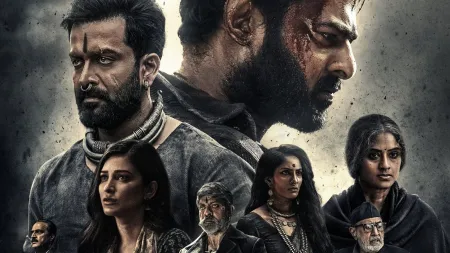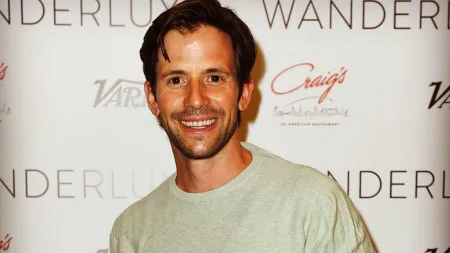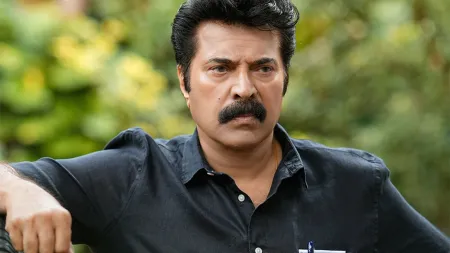An ever-romantic Aravind Swamy singing his heart out for his love; a charismatic Mohanlal and Aishwarya Rai dancing in the rain, exposing the government’s inefficiency; a heartthrob Shah Rukh Khan grooving atop a moving train, rendering one of the most influential Hindi songs ever; a charming Madhavan and Shalini setting couple goals; a devoted father and mother expressing love for their daughter, enumerating her significance to them; a mesmerising Aishwarya Rai savouring the rains in the lush green landscapes of rural India; a Raavan realising the true glory of Sita; a modern couple reflects on love in today’s context while traversing familiar surroundings; and a track mapping the thoughts of a Chola commander.
These are just a few songs that AR Rahman and Mani Ratnam have created in the past 32 years since the two began joining forces. This list doesn’t even have one song each from all their movies, let alone their entire discography. Yet, just the aforementioned songs show that the impact of music composer AR Rahman, celebrating his 56th birthday this Saturday, and filmmaker Mani Ratnam on Indian cinema is unparalleled. They have bestowed the visual art with some of the greatest tracks with extraordinary visuals, mutually enhancing each other’s brilliance, extracting the best from their collaboration, and ensuring the enduring timelessness of their songs and movies.

Movies
Roja (1992)
Thiruda Thiruda (1993)
Bombay (1995)
Iruvar (1997)
Dil Se.. (1998)
Alai Payuthey (2000)
Kannathil Muthamittal (2002)
Aayutha Ezhuthu/Yuva (2004)
Guru (2007)
Raavan/Raavanan (2010)
Kadal (2013)
O Kadhal Kanmani (2015)
Kaatru Veliyidai (2017)
Chekka Chivantha Vaanam (2018)
Ponniyin Selvan I & II (2022-23)
In 2017, AR Rahman told Film Companion that he regards the Roja director as a brother and mentor rolled into one. This mutual sense of belonging and comfort they share in each other’s company, thus fully comprehending the emotions infused into the work by the other, has proven beneficial for both Rahman and Mani in their collaborative endeavours.
Just think about it… In writing or as an idea in the filmmaker’s mind, this moment in Dil Se would sound like this: Amar (Shah Rukh Khan) is hosting his show on All India Radio. This time, he has a new story for listeners — a personal incident that significantly impacted him. It soon becomes apparent that he is meticulously narrating the tale of encountering a stranger woman (Manisha Koirala) at Haflong railway station, Assam, who instantly captivated him. Using readily available objects to create sound effects, he provides listeners with the absolute experience of hearing the “shortest love story in the world”.
But as Amar narrates the story, the song “Ae Ajnabi” fades in, commencing with Udit Narayan’s exuberant voice, intricately describing the man’s yearning for the woman who has captured his heart. Enhanced significantly by Shah Rukh Khan’s charismatic narration and overall ebullience, coupled with Manisha Koirala’s celestial beauty, the song and the on-screen moments collectively leave a lasting imprint on the minds of the audiences.
While many of us have been emotionally stirred by the heartening theme music of Bombay, did you know that this composition spared AR Rahman from being fired by Mani Ratnam during the production of Bombay? Yes, you heard correctly. In an interview shared by O2 India, cinematographer Rajiv Menon recalled that during the shooting of Bombay, they were ready to film “Humma Humma,” but Rahman hadn’t even composed the song, even at the eleventh hour.
“We had to shoot the Humma Humma sequence, but the song wasn’t coming together. After much back and forth, Rahman asked them to come in the evening, as they were supposed to shoot it the next day. Rajiv shared, ‘We go there, and he says I don’t have the tune.’ So, Mani asked, ‘Why did you call us?’ Rahman answered, ‘But I have something else,’ and then he played the theme music of Bombay.”
Rajiv described it as an emotional moment for both him and Mani, with tears in their eyes after hearing the theme music. “Mani said, ‘What have you done Rahman? I have come here to fire you and you are making me cry with this song.’ He responded, ‘I just got this tune.’ So he scored the entire thing for three days, unable to do Humma Humma,”
It’s essential to note here that while “Ae Ajnabi” is a complete soundtrack, the “Bombay theme” is just a background score crafted with instruments, incorporating both Indian flutes and Western strings. Yet, the impact the two tracks have had on the duo as technicians and us as audiences is inexpressible.
Every song that AR Rahman has composed for Mani Ratnam moments and every visual that Mani Ratnam has crafted for AR Rahman tracks harmoniously complement each other, forming absolute and indivisible entities. Thus, this synergy provides a profound sense of nirvana for those who watch and/or listen to them.
Take, for instance, the two versions of the title track in Kannathil Muthamittal: the male version sung by P Jayachandran and the female version by Chinmayi Sripaada. Both artists deliver their renditions in extraordinary manners. The deliberate decision to feature tracks sung by artists of different genders holds narrative significance in the film; and Rahman, recognising this, ensured that vocalists with magical and serene voices were chosen for each rendition.
Understanding the mood AR Rahman crafted through these two tracks, director Mani Ratnam took care to ensure that the visual representation of each version did not appear identical. He envisioned the songs as either distinct entities or two complementary facets of the same narrative, contributing to the captivating beauty of the musical composition and the film as a whole.
One can find such beauty in almost all the songs Rahman crafted for Mani and the visuals that Mani gifted the composer in return. Hence, now that the two are joining hands yet again in Mani Ratnam’s upcoming film titled Thug Life, starring Kamal Haasan in the lead role, expectations are soaring.
Disclaimer: The copyright of this article belongs to the original author. Reposting this article is solely for the purpose of information dissemination and does not constitute any investment advice. If there is any infringement, please contact us immediately. We will make corrections or deletions as necessary. Thank you.







